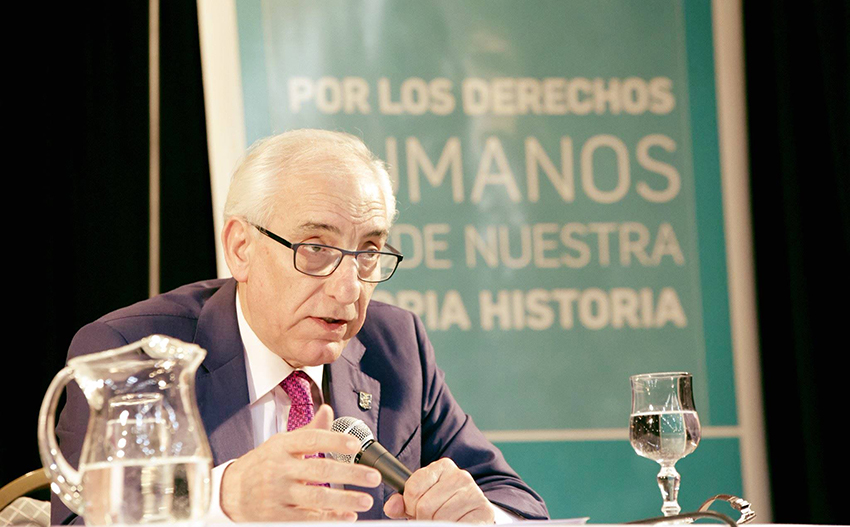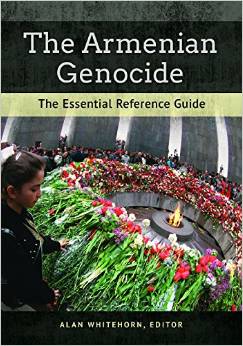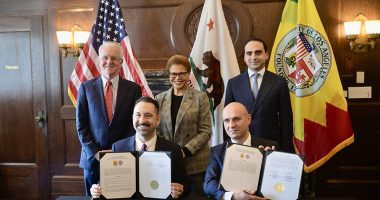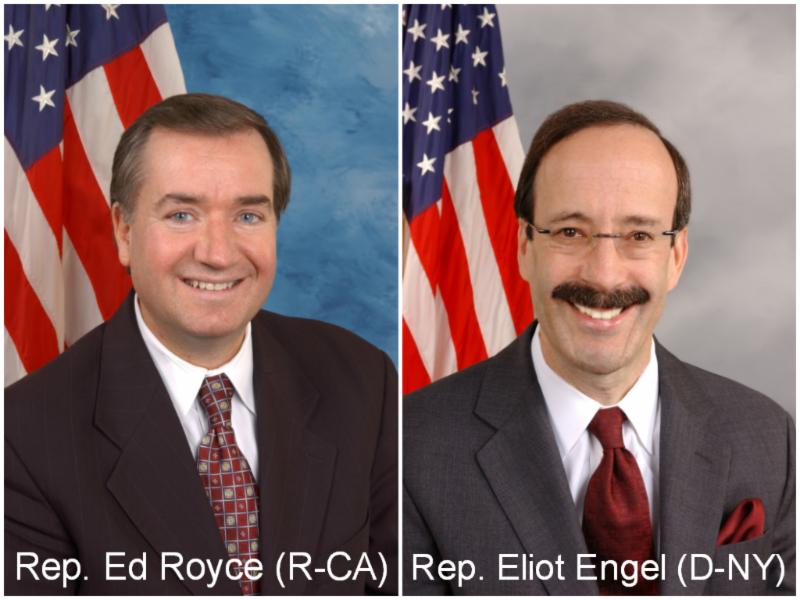BY K.M. GREG SARKISSIAN
NOTE: Throughout my talk, when I use the word “genocide,” I refer to the “act of genocide,” as distinct from the legal term “genocide,” which can be used as a criminal charge to try a perpetrator.
The Armenian Genocide represents the first case of “modern” genocide, as described by Raphael Lemkin, the legal scholar who coined the term, in which a government tried to eliminate an identifiable ethnic, religious, national or racial group of its own citizens, and is recognized by specialists as the prototype for genocide in the 20th century and beyond. I will take a moment here to go over what genocide entails for those who are not aware of the legal definition, as found in the UN Genocide Convention. It involves:
1. Killing members of the group;
2. Causing serious bodily or mental harm to members of the group;
3. Deliberately inflicting on the group conditions of life calculated to bring about its physical destruction in whole or in part;
4. Imposing measures intended to prevent births within the group;
5. Forcibly transferring children of the group to another group.
There is no doubt that what Ottoman Turkey committed was an “act of genocide,” as defined under this convention. However, any attempt to make a claim for retribution using this convention is legally challenged, for two reasons:
a) The 1948 Genocide Convention can not be applied retroactively. This was tested when the participants of the Turkish Armenian Reconciliation Committee (TARC) agreed to apply to the International Centre for Transitional Justice in New York. This was to decide if the Medz Yeghern could be litigable under the 1948 Convention. The ICTJ qualified the Medz Yeghern as an act of genocide, but clearly confirmed that the Convention cannot be applied retroactively to events of 1915, otherwise described as the Armenian Genocide.
b) Another major reason for the inability to use the Genocide Convention as a tool for claims and restitution from Turkey is the absence of “The State” as an actor or perpetrator. The Convention specifically mentions holding individuals responsible for committing genocide, as opposed to the state. This raises a question: Do states that have committed such a crime, or have connived with perpetrators, have immunity?
These points demonstrate the difficulties in using the 1948 Convention retroactively. Nevertheless, we shall momentarily how charges of crimes against humanity have been laid retroactively in the past.
Armenians throughout the world, have been campaigning and lobbying over the last 50 years to convince Turkey, its allies and the world, to acknowledge Ottoman Turkey’s crime of genocide, using the Convention. In fact, certain countries in Europe have gone as far as criminalizing the denial of the Armenian Genocide, such as France and Switzerland, and in the case of Germany, the Bundestag passed the Armenian Genocide Resolution unanimously on June 2, 2016, designating the Ottoman killings of Christian Armenians as genocide.
Unfortunately, the use of “genocide,” a highly politicized term, is challenged by Turkey in the Armenian case, among other reasons because it can not be used retroactively. The Republic of Turkey even challenges and denies the Act of Genocide committed by its predecessor, Ottoman Turkey, despite the fact that the International Center for Transnational Justice has defined the act as such. So how this challenge be overcome?
What legal documents can be best used to convince Turkey’s intellectuals, scholars, policy makers, and even the government and its allies, that what was committed by Ottoman Turkey in 1915 was an act of genocide? The trick is in finding a concrete legal documentation that existed at the very time that the act of Genocide was taking place. This could replace any interpretation of a law that developed decades later in 1948. It would give Armenians a better tool for possible claims for reparations and acknowledgement by the international community, that the survivors of Medz Yeghern and their descendants have the right to claim under international law.
Here, I would like to refer to the post-World War II Nuremburg Trials, where initially some 24 Nazi leaders were indicted under the Charter of the International Military Tribunal, on the following accounts
a) Count One: The Common Plan or Conspiracy
b) Count Two: Crimes against Peace
c) Count Three: War Crimes
d) Count Four: Crimes against Humanity
One of the four counts included Crimes against Humanity, which was applied retroactively to acts perpetrated by the Nazis during World War II, prior to the term “crimes against humanity” being defined in the Charter of the International Military Tribunal, adopted on August 8, 1945. While the term “genocide” was used during the trials to define the “acts” that were committed by the Nazis against the Jews, it did not become part of the final verdicts. Therefore, it could be reasonable to consider applying the same method, retroactively, merely an additional three decades, to apply to the atrocities committed against Armenians in 1915. If the Allied Powers could apply crimes against humanity retroactively at Nuremberg, why could they not do the same regarding the Armenian case?
It has even been stated that the argument for retroactive application of the concept of crimes against humanity in the Armenian case is more compelling than that for the Genocide Convention, given that the idea of crimes against humanity was included in The Hague Conventions of 1899 and 1907, prior to 1915. More importantly, the expression, “crimes against humanity,” is also identified historically with the joint declaration made by the Allied Powers—France, Great Britain and Russia—on May 24, 1915 regarding the Armenian massacres.
The question now arises if it is legally acceptable to apply Crimes Against Humanity in pursuit of recognition and reparations for the Medz Yeghern of 1915. Allow me to take a moment to read the Declaration and demonstrate the legal significance:
“For about a month the Kurd and Turkish populations of Armenia has been massacring Armenians with the connivance and often assistance of Ottoman authorities.
Such massacres took place in middle April at Erzerum, Dertchun, Eguine, Akn, Bitlis, Mouch, Sassun, Zeitun, and throughout Cilicie. Inhabitants of about one hundred villages near Van were all murdered. In that city Armenian quarter is besieged by Kurds.
At the same time in Constantinople Ottoman Government ill-treats inoffensive Armenian population”.
It goes on to say:
“In view of those new crimes of Turkey against humanity and civilization, the Allied governments announce publicly to the Sublime-Porte that they will hold personally responsible for these crimes all members of the Ottoman government and those of their agents who are implicated in such massacres”.
One may conclude that the May 24, 1915 Declaration should be adequate as a potential tool to pursue any attempt to demand retribution for the following reasons:
a) It would be more difficult for Turkey to deny a document which described the act committed by Ottoman Turkey as Crimes Against Humanity as opposed to the retroactive application the 1948 Genocide Convention.
b) The Zoryan Institute’s research has found that the act of the Armenian Genocide was documented through the Ottoman Special Military Tribunal’s criminal prosecution of the perpetrators involved. The courts-martial unfolded over two years (1919–1920). The near omnipotent role played in the organization of the Genocide by the top leaders of a militarized political party, the Young Turk junta, became all too evident. The party that committed these crimes was the Ittihad ve Terakki, or the Committee of Union and Progress (CUP).
Wartime Cabinet ministers, Young Turk party leaders, and a number of other accessories were court-martialled for orchestrating Turkey’s entry into World War I and for the annihilation of the Armenians. Most were found guilty and received sentences ranging from prison with hard labour to death. Talât, Enver, Cemal, and Dr. Nazým were condemned to death in absentia.
More importantly, the documentation for the trials was rendered both incontestable and verifiable by a distinct legal procedure the Tribunal adopted: when on the witness stand, the principal defendants were invited to examine and confirm the authenticity of the many secret and top-secret documents bearing their own signatures. Most of these documents had been secured and authenticated during the pretrial investigations by officials from the ministries of Interior and Justice.
The Ottoman government was forced to release during the trials, authentic Turkish documentation. It includes the personal, eyewitness testimony of high-ranking Ottoman officials, given under oath, on the magnitude of the crimes against the Armenians. The indictments, evidence, and verdicts clearly prove the centralized planning and the genocidal intent of Young Turk government against its Armenian citizens.
This is the first time a national court successfully prosecuted such a case of mass atrocity against its own citizens. The legal principle of “crimes against humanity” that arose in this case had a far-reaching influence and is echoed in the Nuremberg Charter, the Tokyo Charter, and the UN Genocide Convention.
Now, Armenians have to ask themselves an existential question: “What is the goal of legal recognition?” It is many things, and not always the same for everyone. For some, it would be the psychological satisfaction of acknowledgment by the perpetrator nation; for others, the possibility of restorative justice and/or reparations. There are also the important issues of normalized relations with Turkey and security and stability of Armenia going forward. After all, the ultimate objective of Armenians is to convince Turkey to stop its state sponsored efforts of denial and come to terms with the historical facts described in this Declaration, for their sake, as much as for Armenians.
In fact, The Human Rights Association in Turkey has made a strong argument for the racism inherent in the Armenian case. They wrote, “we are the most immediate, direct witnesses of how the denial of genocide (by Turkey) against the Armenians and other Christian ethnic groups of Asia Minor, has, right from the start, generated an anti-democratic system, allowing racist hatred, hate crimes, and violation of freedom of expression and human rights in general…” Thus, Turkey’s acceptance of their past will directly help the democratization of Turkey and progress of peace in the region. Such a development will automatically benefit Armenia as well.
Over the years, the Zoryan Institute’s research on dialogue between Armenians and Turkey has indicated that, notwithstanding political challenges, it may be possible that Turkey may agree to enter into dialogue on the basis of acknowledging the Declaration of the Allied Powers on “crimes against humanity” and the national military trials of 1919. This approach may make the difference in convincing Turkey to deal with the historical facts, which are well documented, and may open the doors for renewed dialogue and diplomacy between the two governments of Turkey and Armenia. It may be more beneficial to pursue dialogue given the challenges Armenia faces, including geopolitical issues such as:
o Turkey has the largest military in the region and an economy at least 100 times that of Armenia’s.
o The tenuous relationship between the neo-colonial Russia and Armenia and Russia’s geopolitical considerations of the nearby border states.
o The sale of Russian arms concurrently to Azerbaijan and Armenia, despite Russia being a military ally to Armenia, knowing well that Azerbaijan has used these arms against Armenia.
o The Russian presence in the boarders between Turkey and Armenia and the potential danger associated with crises emanating from such claims of retribution. Where, as a result, Russia pulls its forces from those borders.
With this said, Armenians must continue to exert all academic and political leverages, wherever possible, particularly in the Diaspora, to ensure that the Republic of Turkey and its allies, admit the incontestability of the Act of Genocide by Ottoman Turkey against its Armenians citizens. At the same time, Turkey and others must be convinced that the denial of this historical fact is immoral and unethical, especially when seen through the prism of Crimes Against Humanity declaration made by the Allied Powers and the military tribunals in 1919.
In conclusion, The Zoryan Institute, among other organizations, is committed to engaging the next generation through education and awareness, to work towards an understanding of the Armenian Genocide as also a Crime Against Humanity, by Turkey and others, while at the same time, developing a path of reconciliation and dialogue with their counterparts in Turkey.
The Institute hopes that in doing so, the incoming generation and their contemporaries in Turkey will accept the facts of history with all the implications and expectations from both sides. They will do so with the hope to correct the official history narrated by the Turkish state, which is a stumbling block for peace and stability in the region. As I wrote in 2006, “…true peace can be achieved only if the nations in the region can talk to each other openly about their past. Therefore, we see education through the Common Body of Knowledge as one of the best ways to alleviate the tension between Turks and Armenians, because it provides a basis of shared knowledge that can counter generations of hostility and lead to mutual understanding and dialogue.”
As Prof. Taner Akçam describes in his book titled, Dialogue Across an International Divide. “A Change of language is a condition…we have sufficient moral fibre and intelligence to evaluate as Crimes Against Humanity, the era of offences and perpetrations, regardless of identity of offenders and their underlying motivations”.
This speech was given by K.M. Greg Sarkissian, the president of the Zoryan Institute, at an event in Buenos Aires co-organized with the Luisa Hairabedian Foundation at the AGBU Center on November 18, 2017. It draws upon the legal publications of Prof. William A. Schabas, a member of the Institute’s Academic Board of Directors.










